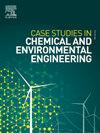Research on the matching relationship of municipal solid waste management and alternative fuel in Indonesia's cement industry
Q1 Environmental Science
Case Studies in Chemical and Environmental Engineering
Pub Date : 2025-01-07
DOI:10.1016/j.cscee.2025.101098
引用次数: 0
Abstract
The cement industry in Indonesia, heavily relies on coal, contributing significantly to greenhouse gas (GHG) emissions. Simultaneously, Java Island generates over 23 million tons of municipal solid waste (MSW) annually, with limited utilization for energy recovery. This study evaluates the feasibility of substituting coal with refuse-derived fuel (RDF) from MSW in Java's cement industry, focusing on environmental, economic, and technical aspects. Scenario analyses indicate that substituting 10%, 20%, and 30% of thermal energy with RDF could divert up to 8.7 million tons of MSW from landfills annually, reducing GHG emissions by up to 2.77 million Gg CO₂-eq. These reductions align with Indonesia's environmental policies and global climate commitments under the Paris Agreement. The economic assessment demonstrates the viability of RDF, with potential annual cost savings of up to $421 million. Beyond addressing coal dependency, RDF adoption supports circular economy practices, reduces landfill reliance, and mitigates environmental pollution. However, challenges such as infrastructure gaps and regulatory barriers require attention. This study provides actionable insights to guide policy formulation, foster industry investment, and facilitate the implementation of RDF-based energy solutions. By bridging waste management and sustainable energy practices, the findings contribute to Indonesia's renewable energy goals, emphasizing the practical applications of RDF for a more sustainable future in industrial operations.
印尼水泥行业城市固体废物管理与替代燃料的匹配关系研究
印度尼西亚的水泥工业严重依赖煤炭,这对温室气体(GHG)排放有很大贡献。同时,爪哇岛每年产生2300多万吨城市固体废物,能源回收利用有限。本研究从环境、经济和技术方面评估了爪哇水泥工业用城市生活垃圾中的垃圾衍生燃料(RDF)替代煤炭的可行性。情景分析表明,用RDF替代10%、20%和30%的热能,每年可从垃圾填埋场转移多达870万吨的城市生活垃圾,减少温室气体排放高达277万Gg CO₂-eq。这些减排符合印尼的环境政策和《巴黎协定》下的全球气候承诺。经济评估表明RDF的可行性,每年可能节省的费用高达4.21亿美元。除了解决对煤炭的依赖之外,采用RDF还支持循环经济实践,减少对垃圾填埋场的依赖,并减轻环境污染。然而,基础设施差距和监管障碍等挑战需要引起重视。本研究为指导政策制定、促进产业投资和促进基于rdf的能源解决方案的实施提供了可行的见解。通过将废物管理和可持续能源实践结合起来,研究结果有助于印度尼西亚的可再生能源目标,强调了RDF在工业操作中更可持续的未来的实际应用。
本文章由计算机程序翻译,如有差异,请以英文原文为准。
求助全文
约1分钟内获得全文
求助全文
来源期刊

Case Studies in Chemical and Environmental Engineering
Engineering-Engineering (miscellaneous)
CiteScore
9.20
自引率
0.00%
发文量
103
审稿时长
40 days
 求助内容:
求助内容: 应助结果提醒方式:
应助结果提醒方式:


